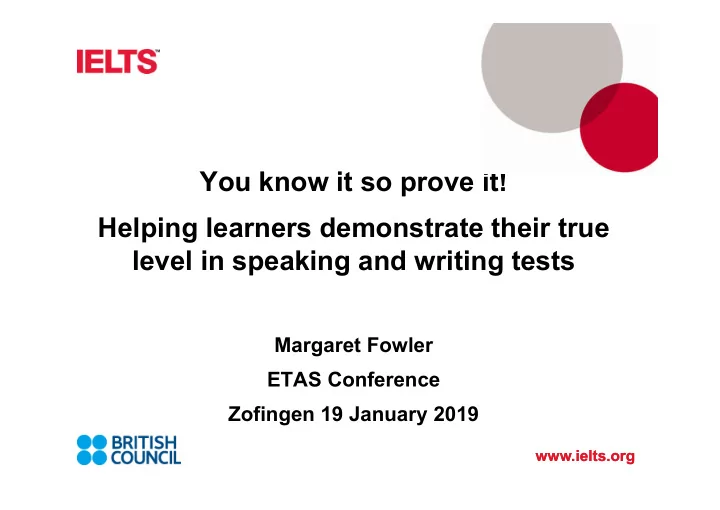

You know it so prove it! Helping learners demonstrate their true level in speaking and writing tests Margaret Fowler ETAS Conference Zofingen 19 January 2019 www.ielts.org www.ielts.org
British Council Examinations Switzerland Public IELTS sessions almost every week, in multiple locations: Zürich, Bern, Luzern, Geneva, Lausanne, Lugano… Dedicated sessions, services and resources for school and institutional partners www.britishcouncil.ch www.ielts.org www.ielts.org
• How many words in the English dictionary? • How many words does the average native speaker know? • How many does a native speaker use in everyday language? • How many do our students know? www.ielts.org www.ielts.org
• How many words in the dictionary? 80,000 • How many words does the average native speaker know? 20,000 • How many does a native speaker use in everyday language? 2,000 • How many do our students know? 2000 - 5000 www.ielts.org www.ielts.org
Aims of workshop • To raise awareness of the need to produce a wide range of vocabulary and grammatical structures in speaking and writing tests • To suggest some ways of practising this in the classroom www.ielts.org www.ielts.org www.britishcouncil.org 5
www.ielts.org www.ielts.org
What is C1/C2 Vocabulary? • No prescriptive lists for IELTS and CAE • English Profile Vocabulary lists • www.ielts.org www.ielts.org www.britishcouncil.org 7
www.ielts.org www.ielts.org
What characterises C1/C2 vocabulary • Less general, more precise and varied lexis • Modifiers • Phrasal verbs • Lexical chunks • Idiomatic language • Appropriacy of register and style www.ielts.org www.ielts.org www.britishcouncil.org 9
Describing personality selfish generous impatient discreet blunt reliable judgmental good fun nosy clever over-sensitive hard-working ambitious open-minded stingy outgoing lazy laid-back disorganised self-assured www.ielts.org www.ielts.org www.britishcouncil.org 10
The importance of modifiers B: Describe someone you don’t lke: She’s so ……….., really ………, rather ……….. terribly ….. not very …. He tends to be ………. She can be rather ….. www.ielts.org www.ielts.org www.britishcouncil.org 11
A new year warmer …….. I can be rather judgmental …. I tend to be …………… I’m terribly judgmental so this year I’m going to try to be more open- minded What about you? www.ielts.org www.ielts.org www.britishcouncil.org 12
Importance of using lexical chunks an important commercial centre ... run-down estates a vibrant cultural centre affluent suburbs a major tourist attraction steeped in history a sprawling metropolis densely populated gridlocked , rush-hour traffic friendly and welcoming one of our best-kept secrets seriously polluted accessible open spaces difficult to get around www.ielts.org www.ielts.org www.britishcouncil.org 13
Personalising phrasal verbs and idioms I don’t get on very well with ………….. I’ve always looked up to ………….. I’m no longer in touch with ……………… I would be sorry if I fell out with……………… I’ve grown apart from ………….. I take after ……….. My … and I ……… grew up together I think I’ll always be close to ……………………………. www.ielts.org www.ielts.org www.britishcouncil.org 14
Techniques to use more varied tenses The PPF Strategy Present Past Future Teachers resource materials: on British Council IELTS site www takeielts.org www.ielts.org www.ielts.org www.britishcouncil.org 15
www.ielts.org www.ielts.org www.britishcouncil.org 16
Predicting questions for various topics Reasons why people become famous Disadvantages of Celebrities in the past CELEBRITY being famous Celebrities as role models www.ielts.org www.ielts.org www.britishcouncil.org 17
Think ….. Compare the present with the past Predict how things will change in the future Speculate about and analyse the issues Discuss these topics with your partner as the assessor/examiner The media Advertising Food www.ielts.org www.ielts.org www.britishcouncil.org 18
Modifying language • Quantifiers: some, many, most • Verbs: appear, seem, tend • Frequency adverbs: sometimes, often, rarely • Modal verbs: can, could, may • Probability adverbs: possibly, probably, perhaps • Expressioms: • It is said that, It is possible, In some circumstances www.ielts.org www.ielts.org
Resources for preparation www.ielts.org www.ielts.org
Free resources for preparing for IELTS www.takeielts.org Road to IELTS www.ielts.org www.ielts.org
Road to IELTS • 10 hours of free on-line self-study materials from the British Council available on our website at www.britishcouncil.it/ielts • practise IELTS listening tasks under timed conditions • view sample videos of speaking tests, highlighting good and less good practice • develop vocabulary and techniques for writing tasks • and when you register, another 20 hours of free online self-study materials britishcouncil.ch/ielts www.ielts.org www.ielts.org
To find out more ..... www.britishcouncil.ch www.takeielts.org www.learnenglish.britishcouncil.org www.cambridgeassessment.org The British Council stand! Publishers’ stands britishcouncil.ch www.ielts.org www.ielts.org
www.britishcouncil.ch ielts@britishcouncil.ch Adrian.Judele@britishcouncil.ch www.ielts.org www.ielts.org
Recommend
More recommend